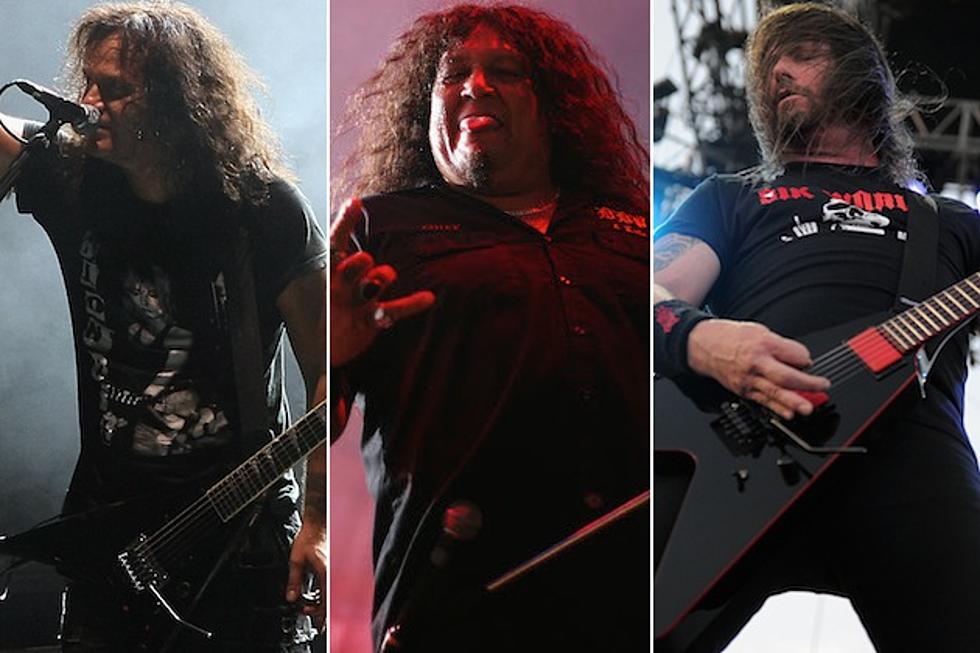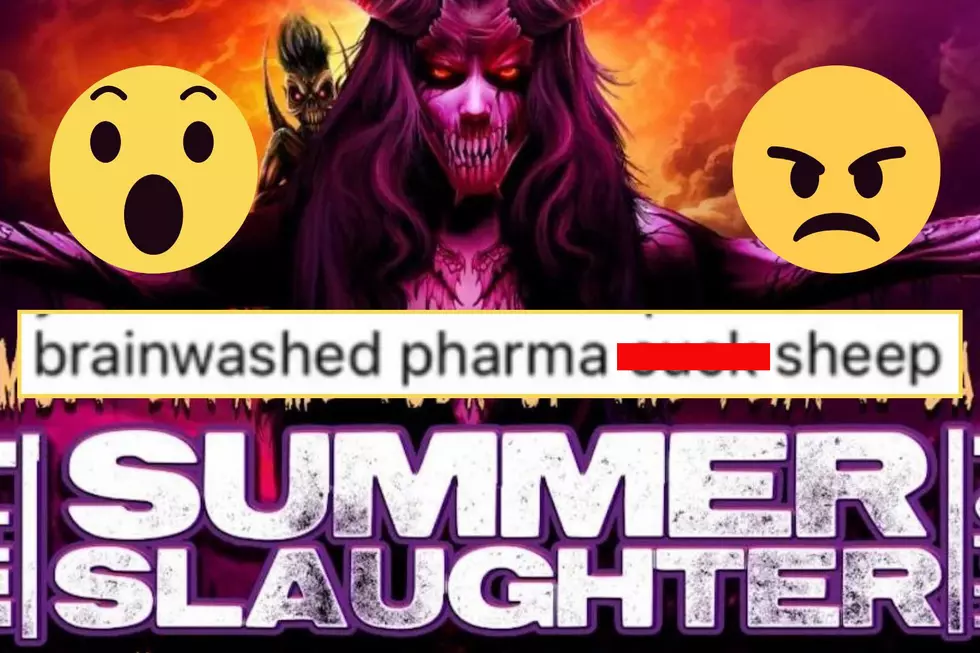
10 Best Thrash Albums NOT Released by the Big 4
Believe it or not, thrash metal does not inhabit a flat earth, where ocean waters cascade off a cliff into infinity, just beyond view of familiar Big 4 oceans dominated by Metallica, Slayer, Anthrax and Megadeth. No, in actual fact, the thrash metal map would be quite incomplete without the crucial contributions of numerous bands and the seminal LPs with which they helped fill in this popular heavy metal sub-genre’s more nebulous reaches. So join us as we round out (pun intended) the geography of global thrash metal with the 10 Best Thrash Albums NOT Released by the Big 4:
- 10
’The Years of Decay' (1989)
OverkillOverkill, one of the very first thrash bands of all time kicks off our list with their fourth and arguably best album, 1989’s ‘The Years of Decay.’ Here, New Jersey’s finest celebrated their first decade of activity with a surprisingly refined, even ambitious set that pushed their patented rough-and-ready style to occasionally epic songwriting lengths — and still the musical cocktail worked, though not for soon-ousted guitarist Bobby Gustafson.
- 9
Alice in Hell' (1989)
AnnihilatorSpeaking of refinement, that was perhaps the key distinction of Annihilator’s acclaimed debut, ‘Alice in Hell,’ which wed metronomic performances spearheaded by exacting bandleader, Jeff Waters, with ample melodicism and lyrics so intellectual (see ‘Alison Hell,’ ‘Ligeia,’ etc.) they sent listeners scurrying to their local libraries. Thankfully, thrillingly thrashers like ‘W.T.Y.D.’ and ‘Human Insecticide’ leveled the playing field with more simplistic and violent fun.
- 8
'Frolic Through the Park' (1988)
Death AngelAny one of Death Angel’s first three LPs could stake a claim for a place among the 10 Best Thrash Albums NOT Released by the Big 4. So we’ll split the difference between the group’s precociously technical debut, ‘The Ultra-Violence,’ and the more direct and mature, ‘Act III,’ by highlighting 1988’s sophomore ‘Frolic Through the Park’ as containing some of the best of both worlds.
- 7
’Lights, Camera, Revolution' (1990)
Suicidal TendenciesSome seven years after delivering one of history’s ultimate skatecore/crossover LPs, Suicidal Tendencies completed their transition into a bona fide thrash band with 1990’s ‘Lights, Camera, Revolution,’ featuring numerous thought-provoking screeds from charismatic frontman Mike Muir, backed by Rocky George’s precision virtuosity. None of them more colossal than ‘You Can’t Bring Me Down.’
- 6
‘Doomsday for the Deceiver’ (1986)
Flotsam and JetsamPrior to being handpicked by Metallica to try and fill Cliff Burton’s massive shoes, Jason Newsted of course led Arizona thrashers Flotsam and Jetsam, whose expansively named debut album, ‘Doomsday for the Deceiver,’ revealed a balanced blend of concise thrashing and epic songwriting, filled with budding promise. Sadly, much of it would remain unfulfilled after the bassist’s departure, despite F&J’s continued production of solid LPs for years to come.
- 5
‘Time Does Not Heal’ (1991)
Dark AngelArguably the last essential album released during thrash metal’s golden era, ‘Time Does Not Heal’ capped a critically distinguished, but commercially underrated career for L.A. thrashers Dark Angel. Famously promoted, at the time, for containing “9 songs, 67 minutes and 246 riffs” (personally counted by drummer extraordinaire, Gene Hoglan), the group’s fourth and final album represents the apex of thinking man’s thrash, while sacrificing not an ounce of ferocity while getting its point across.
- 4
’Handle with Care' (1989)
Nuclear AssaultNew York’s other top thrash band, Nuclear Assault, was launched in 1984 by ousted Anthrax bass player Danny Lilker and vocalist/singer John Connelly (briefly an Anthrax roadie!), with the goal of pursuing a more aggressive and adventurous musical agenda than their erstwhile bandmates. Well, mission accomplished — especially on the group’s third full-length, ‘Handle with Care,’ which married wanton velocity with conscientious lyrics to earn a slot among the 10 Best Thrash Albums NOT Released by the Big 4.
- 3
‘Extreme Aggression’ (1989)
KreatorThe kings of German thrash continually pushed the limits of brutality throughout the 1980s, setting the stage for death metal and other extreme sounds with devastating albums like ‘Pleasure to Kill’ and ‘Terrible Certainty.’ But their most well-rounded effort was arguably 1989’s ‘Extreme Aggression,’ which coincidentally marked Kreator’s biggest U.S. sales, backed by frequent Headbanger’s Ball exposure for teeth-gnashing moshers like ‘Betrayer’ and its formidable title track.
- 2
'Bonded by Blood' (1985)
ExodusThe Bay Area thrash metal scene’s founding fathers and eternal unfulfilled champions, Exodus were also responsible for delivering a genre cornerstone in 1985’s ‘Bonded by Blood.’ Since then, much has been said about the LP’s delayed release and how it damaged Exodus’ chances of turning the Big 4 into a Big 5 (along with deficient marketing, personnel issues, etc.); but with each year that passes, both the band and their greatest creation earn broader respect and recognition, albeit in belated fashion. But hey, better late than never…
- 1
’The Legacy' (1987)
TestamentTestament's awesome debut album, ‘The Legacy,’ is, if not quite as important to the development of thrash as Exodus’ first, arguably the more constant through and through. Hence it is the headliner of our 10 Best Thrash Albums NOT Released by the Big 4, thanks to stunning combinations of muscle and melody like ‘Over the Wall,’ ‘The Haunting,’ ‘Do or Die’ and ‘Apocalyptic City’ (plus the purely decapitating ‘C.O.T.L.O.D.’). Why this LP didn’t see Testament challenging Metallica’s very thrash metal supremacy remains a mystery, but one that does nothing to diminish its incredible qualities and staying power.
More From Loudwire









